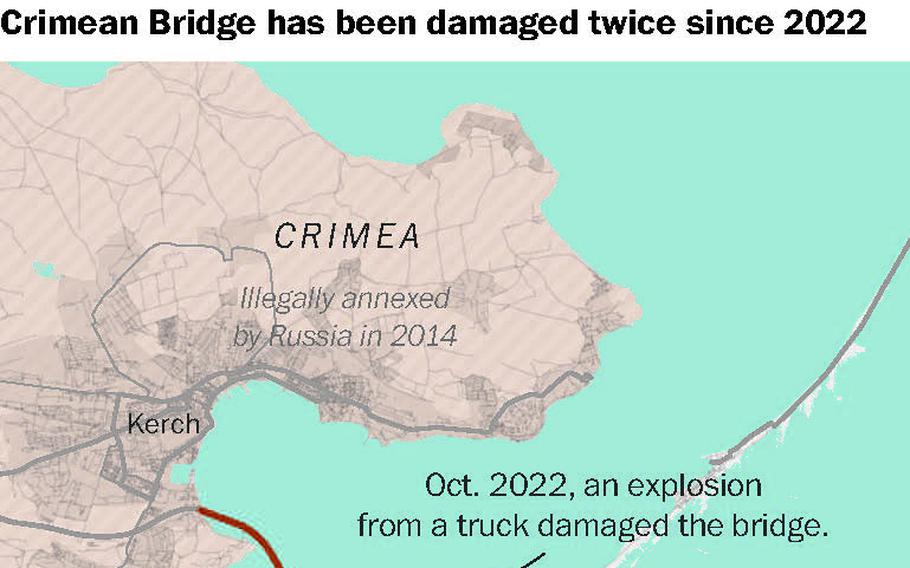
(The Washington Post)
On Monday, Ukrainian forces struck the Crimean Bridge, a key link that connects mainland Russia to Crimea — which Moscow illegally annexed in 2014 and has since occupied. Two were killed in the explosion.
Kyiv's navy and special forces carried out the nighttime drone boat attack, a Ukrainian official said, speaking on the condition of anonymity to discuss sensitive military operations.
This is the second time the bridge has been attacked in the war, highlighting its strategic importance to both Ukraine and Russia. In October, a giant fireball ripped across the bridge after a truck exploded, igniting the fuel tanks of a passing train; the bridge was substantially damaged, leading to months of repair work. A Ukrainian official told The Washington Post in October that the explosion was orchestrated by Ukraine's special forces.
The bridge, like the Crimean peninsula itself, has symbolic and strategic value to Russia, serving as an emblem of identity and power — on top of being a logistical and military asset. Here's what you need to know about the bridge:
What is the Crimean Bridge?
The Crimean Bridge, also known as the Kerch Bridge, is a 12-mile, $3.7 billion infrastructure project with two parallel tracks: one four-lane road for traffic and a two-lane rail line. The structure connects mainland Russia to Crimea, a peninsula that Russian President Vladimir Putin annexed from Ukraine in 2014. It's the longest bridge in Europe.
Crimea, which juts out of the southern part of mainland Ukraine between the Black Sea and the Sea of Azov, is home to 2 million people. After invading and annexing the peninsula, Moscow held a widely disputed referendum on the territory's status, claiming that an overwhelming majority of residents wanted to join Russia. Most of the world still sees Crimea as part of Ukraine, with only a few countries recognizing Moscow's sovereignty over it.
Russia used Crimea as a southern staging ground for its invasion of Ukraine. Control of the peninsula also allowed Russia to carry out its wartime naval blockade.
The bridge was viewed as a marquee infrastructure project for Putin. It also offers a driving route to the Crimean peninsula, which is a popular summer vacation spot for Russian tourists who relax at resorts and on beaches along the Black Sea — all while staying within Russia's self-declared borders. Monday's attack occurred at the height of the holiday season.
Where is the Kerch bridge?
The Kerch bridge connects Crimea — which shares a land border with Ukraine's southern Kherson region — and Russia's southwestern Taman peninsula.
One stated and achieved goal of Russia's invasion of Ukraine is to create a "land bridge" from Russia to Crimea by illegally occupying and annexing four Ukrainian regions - Luhansk, Donetsk, Zaporizhzhia and Kherson - on Ukraine's southeast border.
What is the history of the bridge?
The bridge is seen as a personal pet project of Russian President Vladimir Putin, who inaugurated the bridge in 2018 in a made-for-television ceremony that got wall-to-wall coverage on Russian state media. Putin drove an orange Kamaz truck flying Russian flags across the bridge, and called the completed project a "miracle."
"In different historical epochs, even under the czar priests, people dreamed of building this bridge," Putin declared at the opening ceremony.
Many Western nations immediately condemned the construction of the bridge, which they saw as a further violation of Ukraine's sovereignty.
In 2016, the State Department put sanctions on companies involved in the construction of the bridge and other related individuals. Putin had tapped a longtime friend and judo partner, Arkady Rotenberg, to oversee its costly construction.
Why is the bridge important to Russia?
The bridge, and Crimea itself, has long been a gray zone and flash point for Russia and Ukraine — a condition that has only been aggravated during the war. Ukraine has made disrupting the land bridge a primary goal of its counteroffensive.
Strategically and militarily, the bridge is critical for the Kremlin. The bridge was for years Russia's only road and rail link to occupied Crimea — a fact that only changed after Russian forces invaded southeastern Ukrainian territory. The bridge has also served as a key military supply route, allowing Russian forces to supply bases in the occupied territories.
The bridge is also personally important to Putin and the Kremlin. It symbolizes Putin's ability to deliver on major infrastructure projects and his dreams of restoring Russia to its former greatness. Crucially, it is also emblematic of Russia's ambitions to control Ukraine and to solidify its claim to Crimea.
The Washington Post's Mary Ilyushina, Robyn Dixon and Adam Taylor contributed to this report.